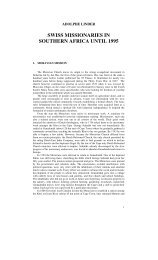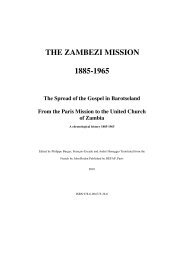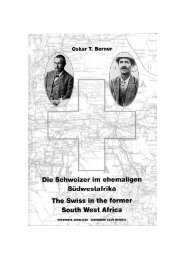THE SWISS IN SOUTHERN AFRICA 1652-1970 - swissroots-za.ch
THE SWISS IN SOUTHERN AFRICA 1652-1970 - swissroots-za.ch
THE SWISS IN SOUTHERN AFRICA 1652-1970 - swissroots-za.ch
Create successful ePaper yourself
Turn your PDF publications into a flip-book with our unique Google optimized e-Paper software.
Baarth, Johan Adam born “Herbroek” [Barth? Heerbrugg SG??). 1788-1789 soldier.<br />
/ KAB, MR CA 1787-1788.<br />
Emdorff, Jacob born Berne [Imdorf of Guttannen BE?] 1788 gunner, sick. / KAB, MR<br />
1788.<br />
Mongin, Charles Anthoine born Pourytry [Porrentruy JU?] 1788 sailor, sick. / KAB,<br />
MR 1788.<br />
Chevallier, Anthony of “Zwitserland” [GE, NE or VD?], 1788 soldier, sick. / KAB,<br />
MR 1788.<br />
Hanneman, Jacob born SG [Hannimann of Mörs<strong>ch</strong>wil SG?], arrived 4.1.1788 on<br />
Dorwijk. 1789 soldier, sick.1791 junior sailor sick. About mid Mar<strong>ch</strong> loaned to Willem<br />
Kirsten until 28.8.1793. 1 September 1795 listed as not receiving pay and did not report<br />
at Company’s offices. / 1 KAB, C 1004, p. 98; 2 KAB, MR 1789, 1791; 3 KAB, C 1064,<br />
p. 1907.<br />
Tredoux, Jacques-Gideon born Aigle VD. Baptised 9.4.1767 in the Waalse Kerk, at<br />
The Hague, eldest son of Claude Francois Tredoux of Aigle VD and Helena Catharina<br />
Le Beou (or Le Beon) of Middelburgh, Zeeland. The name Tredoux has died out in<br />
Switzerland.<br />
Arrived 6.4.1788 on Bletterwijk as Sub-Lieutenant. 1 Here he was appointed full<br />
Lieutenant and for the next years served on various locally based ships. His duties are<br />
illustrated by an incident whi<strong>ch</strong> happened in 1795 when he was responsible for bringing<br />
from Saldanha Bay a quantity of sugar, rice and coffee beans whi<strong>ch</strong> had been<br />
dis<strong>ch</strong>arged there by the fleet returning from the East. The Company debited him with<br />
the sum of fl 1 190 (equivalent to his year’s pay) for dis<strong>ch</strong>arging a lesser quantity in<br />
Cape Town. Tredoux successfully requested not to be held liable for the loss, blaming it<br />
on bad bags. 2<br />
With the British occupation Tredoux lost his appointment and established himself as a<br />
law- and general agent in Keerom Street, possibly also doing transport work: the 1807<br />
census shows him as having eleven male and seven female slaves, two four-wheeled<br />
and two two-wheeled wagons or carts and nine horses. 3<br />
At about this time several Fren<strong>ch</strong> speaking immigrants arrived, amongst them Jeremie<br />
Auguste Rouviere of Neu<strong>ch</strong>atel and Louis Balthasar Meurant of Basel. They rekindled<br />
local theatrical activities, whi<strong>ch</strong> had been introduced by the Fren<strong>ch</strong> regiments<br />
garrisoned here earlier. Tredoux and his <strong>ch</strong>ildren took a very active part in productions.<br />
Initially the plays presented were in Fren<strong>ch</strong>. Tredoux pioneered the use of Dut<strong>ch</strong>.<br />
During the years 1806-1825 Tredoux was director of the theatre company Tot Nut en<br />
Vermaak and his son Jacques Gideon 1825-1826 of the <strong>ch</strong>ildren’s company Tot<br />
Oefening en Smaak. In 1825, at the age of 58 Tredoux still danced in the corps de ballet<br />
in a Dut<strong>ch</strong> translation of Moliere’s Bourgeois Gentilhomme. Obviously he was still full<br />
of energy and had a slim figure: the play is not a comic opera in whi<strong>ch</strong> you can have a<br />
rotund elderly gentleman bouncing about the stage! 4<br />
FAVOURS <strong>IN</strong> HIGH PLACES<br />
The successive Fren<strong>ch</strong> and English speaking garrisons had staged many plays in their<br />
native tongues but Tredoux, very proud of his new homeland, catered for the Dut<strong>ch</strong><br />
speaking inhabitants of the Cape. He may also have felt some hostility towards the<br />
British who had twice invaded the Cape. On a certain occasion, at a Dut<strong>ch</strong> play, General<br />
Grey, Commanding Officer of the British forces at the Cape entered the theatre and the<br />
band of an English regiment whi<strong>ch</strong> had been permitted to attend the evening for the<br />
107







